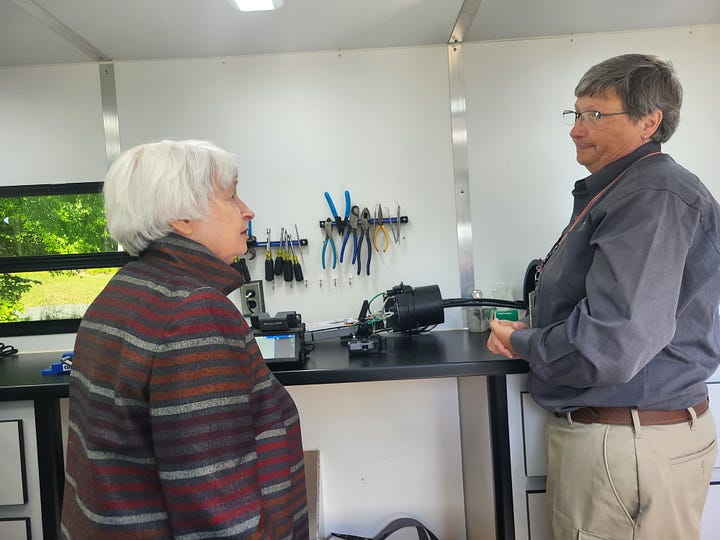Yellen, Biden Score a Win in Stafford
Treasury Secretary Yellen celebrated almost 700 homes gaining high-speed internet access in Stafford. Pending additional government funds could connect all Virginians in near future.
by Martin Davis
EDITOR-IN-CHIEF
About two miles from Richland Baptist Church in Stafford, U.S. Treasury Secretary Janet Yellen was getting a crash course in splicing and testing fiber optic wire on Monday morning when her tutor, Jody Gehring — a network maintenance technician — announced, “Snake Eyes!”
The reference was to two white blinking lights that alerted Yellen she had properly completed her task. It was a fun way to celebrate the completion of Comcast’s initiative to bring broadband to nearly 700 homes in Stafford’s Hartwood and Rock Hill districts.


That work was made possible in part by funding from the Commonwealth of Virginia’s Telecommunications Initiative (VATI) — funds for that were provided through President Joe Biden’s American Rescue Plan Act of 2021.
In her roundtable discussion following the demonstration, Yellen stressed that “Investing in high-speed internet is an administration-wide priority, with a goal of connecting every American by 2030.”
The impact of this funding is hard to underestimate.
“The financial and educational impact is enormous,” said Stafford Board of Supervisors’ chairwoman Meg Bohmke at a roundtable following the demonstration Yellin took part it.

Bohmke referenced the phone calls the Board had received from residents who were frustrated that after moving to Stafford from elsewhere they could not access internet service. In addition, people expressed concerns that they couldn’t sell their homes because they didn’t have internet access.
“The VATI grant took those problems away for over 650 households,” said Bohmke.
While federal, state, and local dollars are key to rural broad-band rollout, private investment is also key.
“Comcast,” said Broderick Johnson, the company’s executive vice president for public policy and executive vice president for digital equity, “has invested nearly $900 million dollars in our technology and infrastructure in Virginia over the past three years.”
“But,” he continued, “the physical broadband connection is just the start.” In an effort to address affordability, digital literacy, and more, he points to “Project UP,” through which Comcast is investing “more than $39 million dollars to more than 127 local non-profits across Virginia.”
While today’s announcement marks an important step forward in expanding broadband to rural areas, significant challenges remain.
The cost for private companies like Comcast to build out networks to limited numbers of residents is not financially feasible. So public-private partnerships like the one modeled today in Stafford will be critical for future rollout.
Following the roundtable, the Advance asked Secretary Yellen about closing the digital divide to rural communities, 20% of whose citizens still don’t have internet access.
“Bipartisan Infrastructure Law contains substantial funding for additional investments in broadband. I believe I heard from participants in the roundtable that they expect when that funding comes through, it should be sufficient to connect most families in Virginia with broadband.”
Asked how long it would take, the Secretary responded that she was “not positive what the timeline is, but hopefully over the next several years.”
“Bipartisan Infrastructure Law contains substantial funding for additional investments in broadband. I believe I heard from participants in the roundtable that they expect when that funding comes through, it should be sufficient to connect most families in Virginia with broadband.”
— U.S. Treasury Secretary Janet Yellen
Yellen said in her roundtable comments that “The Bipartisan Infrastructure Law’s Broadband Equity Access and Deployment program … provides $42.5 billion, and this is the largest investment for internet in our history. This will mean an additional $1.5 billion for high-speed internet in Virginia.”
Local Obituaries
To view local obituaries or to send a note to family and loved ones, please visit our website at the link that follows.
Weather and Traffic
Support Award-winning, Locally Focused Journalism
The FXBG Advance cuts through the talking points to deliver both incisive and informative news about the issues, people, and organizations that daily affect your life. And we do it in a multi-partisan format that has no equal in this region. Over the past month, our reporting was:
First to report Mary Washington Healthcare's move to close Kid's Station Daycare
First to detail MWHC's taking actions that undermine the viability of the Moss Free Clinic.
First to detail and then expose the controversy surrounding the Riverbend High School swim team
Providing the region's best political coverage of the upcoming 7th District Congressional race.
For just $8 a month, you can help support top-flight journalism that puts people over policies.
Your contributions 100% support our journalists.
Help us as we continue to grow!







Great. The IIJA (the somewhat recent bipartisan infrastructure law), whose BEAD program is discussed here, addresses funding needs for availability (BEAD) and affordability. The latter piece is called the ACP (affordable connectivity program). Its $14 billion in funding, which was used to connect over 20 million eligible low income consumers to broadband service, is expiring this month. Congress is debating whether and how to extend ACP as we speak.